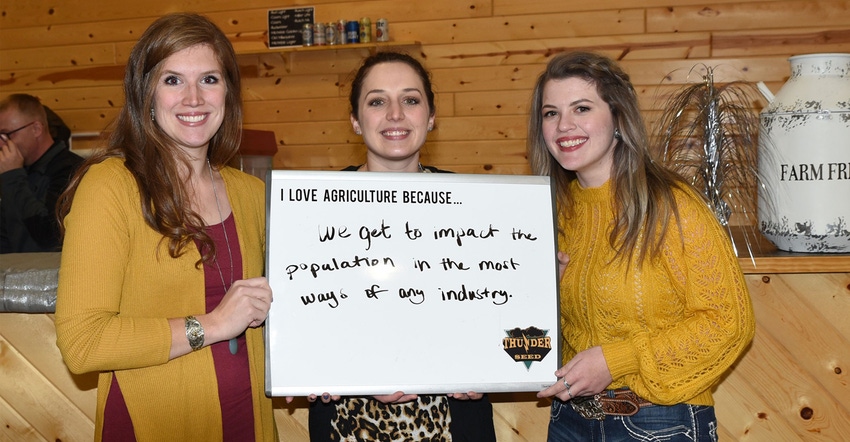March 12, 2021

Before COVID-19, when we still had in-person events, I was usually one of only a handful of women working at farm events or farm shows. Many of my agriculture colleagues are also women, but I’d often find myself sitting with male farmers, agronomists or economists at these events. As one of my favorite women who works in agriculture says, “There’s never a line for the bathroom,” when talking about how many other women attend farm shows and events.
I remember multiple instances of farmers who asked me if I was there to get information for my dad’s or my husband’s farm, and seeing their look of surprise when I answered that there was no family farm I belonged to, this was my job. One farmer even came up to me and said he loved to see young women working in agriculture, because he had daughters who hoped to become involved on their family farm.
I was never someone who really celebrated International Women’s Day or Women’s History Month, because the women I work with are valued and known as an integral part of our industry.
Women in ag wear multiple hats
When visiting farms, I will usually talk to the entire family if I can, including husbands, wives and older children. Many times women will tell me, “I’m just a farm wife” and direct all questions toward her husband, which always sat wrong with me. While I don’t have firsthand experience with how much “just farm wives” do, I know they don’t give themselves nearly enough credit.
Even if women aren’t the main operator or decision-maker on the farm, I can almost guarantee that they hold a share of the planning, finances, scheduling, purchases and more for their family and farms. Those women who said they were “just a farm wife” didn’t think that the hours they spend bringing meals to the field in planting and harvest, their days spent running to town to get that broken equipment part, or the nights they spent watching pens during calving season as essential farm work.
In my experiences, women typically do all of that in addition to an off-farm job. Their days could even be busier if they have children, who go to the same activities as families that didn’t have a farm to take care of.
30% run operation
Of course, we can’t forget the women who are the main operators, farmers and decision-makers on their operations. According to the USDA, women make up 30% of on-farm operators as of 2017. The number of U.S. farms operated by women have nearly tripled over the last decade.
Often there is the underlying bias that women are the farm wives, and men are the true farmers. Even if they don’t farm themselves, the women in agribusiness I get the pleasure to work with are some of the true rock stars of the agriculture industry. Through various professional organizations and people in my network, I know that women on and off the farm do so many things to help farmers, producers and their own families.
Looking into our commodity group leaders in the state, nearly all of them are run by women sitting in the executive director or other executive role. Women play key leadership roles within Extension, farm management and marketing organizations, financial institutions, and law or policy work, as well as agronomy, nutrition and technology companies. Professional organizations, sororities and fraternities, and nonprofits all exist to help guide and improve women involved in agriculture.
I found many of the women I look up to as unofficial mentors in this industry through professional networks, but I’ve learned to never underestimate the networking and connection that happens in ag on Twitter. There are programs built to encourage and teach women to take a leadership role in the farm, companies devoted to spotlighting women agriculturalists, seminars to teach women how to market their farm, and so much more.
This combination of phenomenal women in leadership, programs and encouragement for younger women, and seemingly endless opportunities for careers all play a role in why women thrive while working in agriculture. To me, agriculture is one of the best industries for women to work in, and I am fortunate to have the chance to work with some of the best men and women around.
You May Also Like




